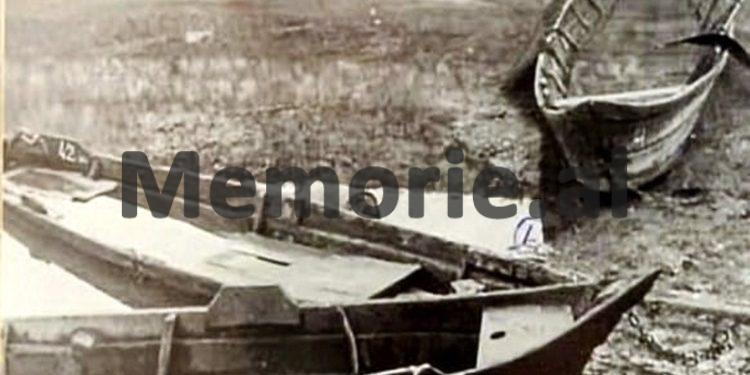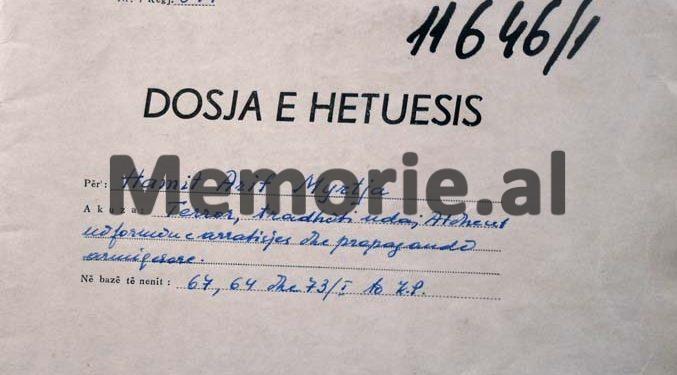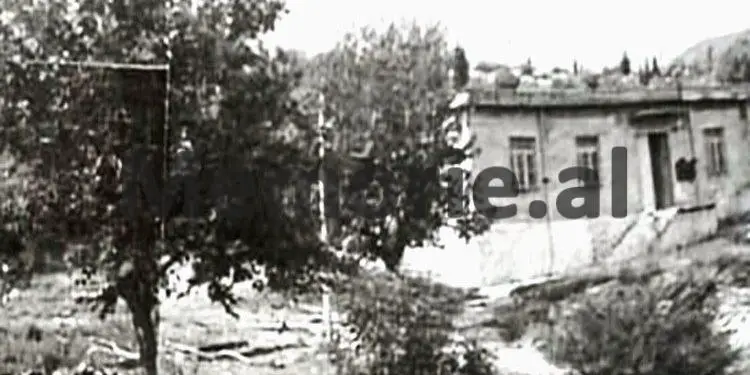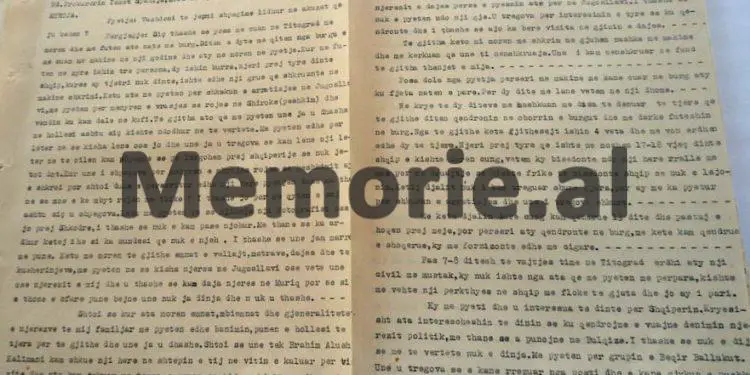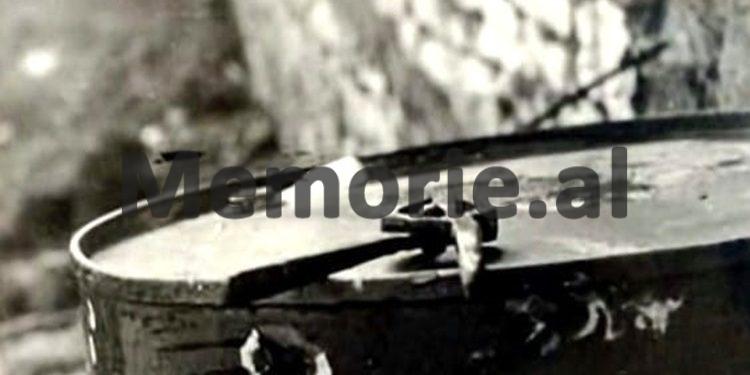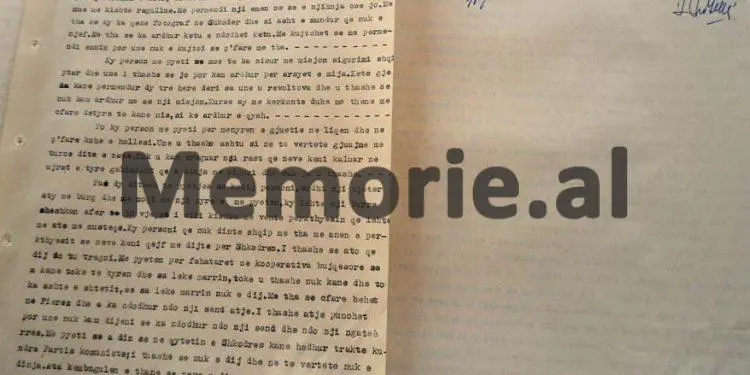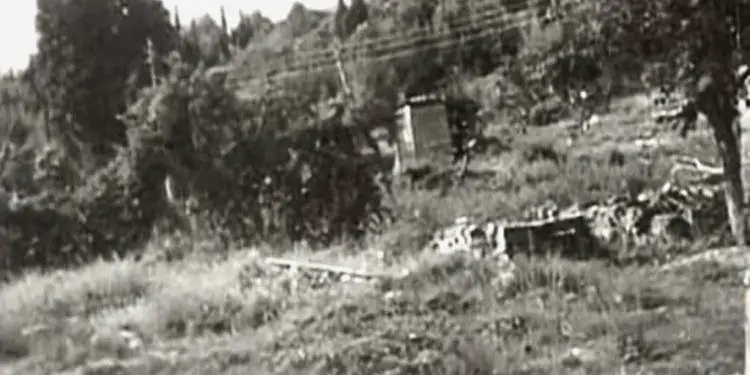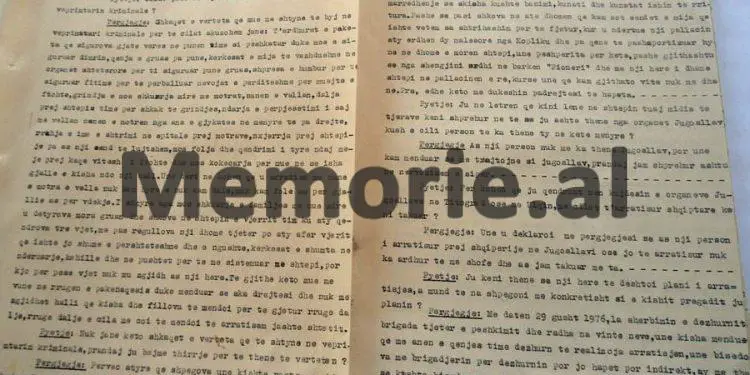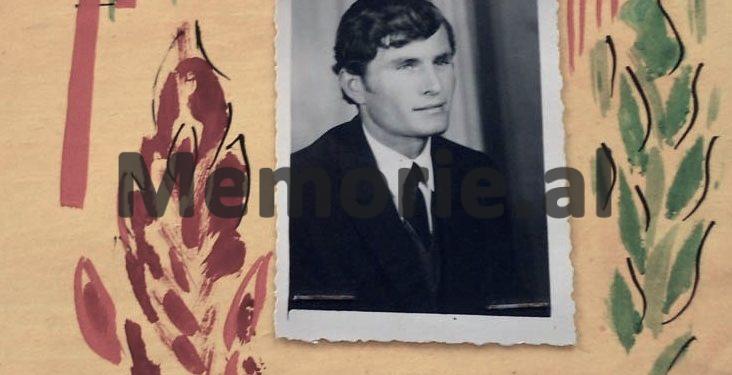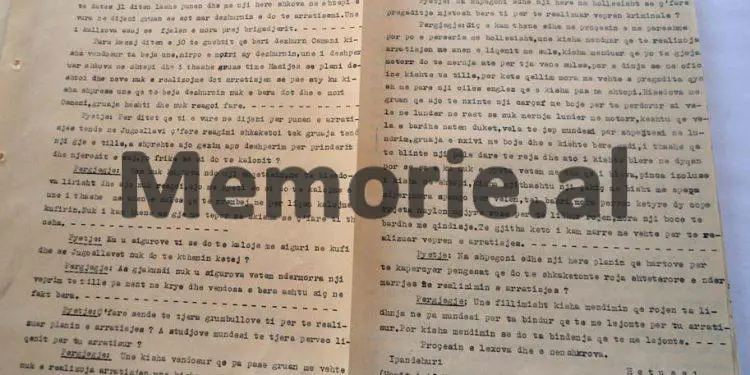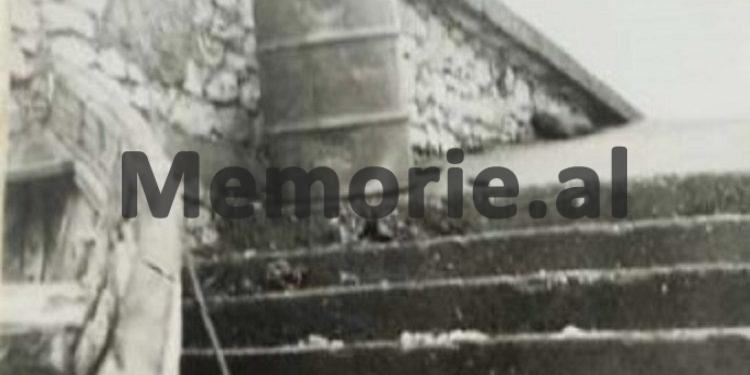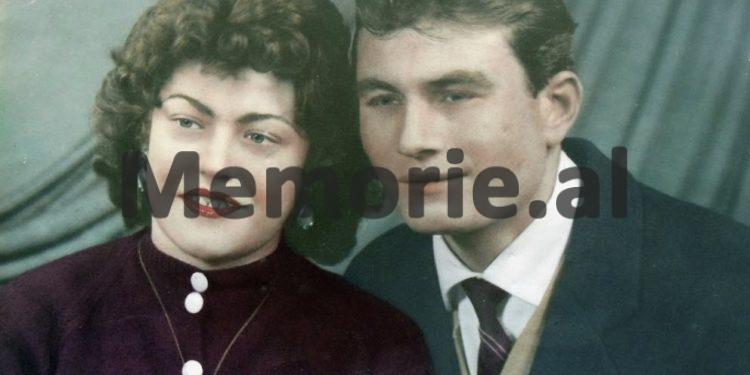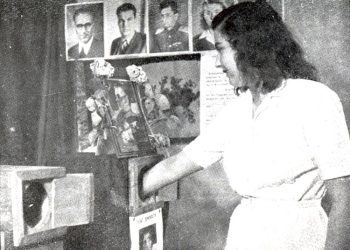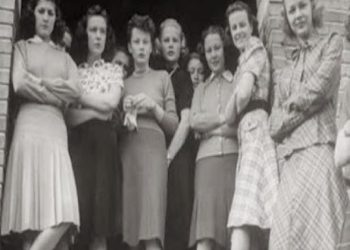By Dashnor Kaloçi
Part five
Memorie.al / It was the morning of September 1, 1976, when the workers of the Fishing Enterprise who were the first to arrive at their workplace located on the shore of Lake Shkodra near the village of Shiroka, found that the guard of the enterprise of that sector was surprisingly missing, as well as the office staff, something that had never happened before?! This is because, among other things, there was also the pier where all the fishing boats were anchored, which, tied with chains and locked with a key, were considered objects of special importance and were under the control and double guard, both by the fishing enterprise and by the Border Post located in the village of Zogaj, where the state border with Montenegro, at that time part of the Federal Republic of Yugoslavia of Marshal Tito, was also located.
Although a torrential and stormy rain continued to fall, which had started since midnight, the fishermen began to look for the guard and the foreman of their company, calling them by name, but in vain, because no one answered? But after a while, they were stunned and terrified, when just a few meters away from the fish warehouse, they saw a corpse lying on the ground with no signs of life…! It was the 50-year-old guard, Fadil Rizaj, who had been serving in that position for several years. No one dared to touch him with their hands, because not only was he bloody and with visible marks on his head and body, but his hands were tied with rope from behind his body and also his respiratory organs, tied with a cloth behind his head…! Which clearly meant that he had been killed…!
After that scene of horror, some of the fishermen ran to the offices to call the heads of their company and the Internal Affairs Branch as well, but the telephone line was cut and the connection to Shkodra could not be established…! Meanwhile, from other checks to find the company’s wreck, it was also found that one of the boats (fishing boats) was missing from the pier on the lake shore, precisely the one known as; “Health Boat”, and the safe that held their keys, was broken with a crowbar!
Meanwhile, the alarm was given and there were some of the officers and main chiefs of the Shkodra Internal Affairs Branch, who immediately determined that not only were they dealing with a serious crime, but also with an escape by boat across the lake, which, among other things, would also aggravate their position before their superiors at the Ministry of Internal Affairs in Tirana. Meanwhile, the news spread and the investigative group with the relevant experts immediately began work to uncover the crime that had occurred and unravel the entire event, which a few days later would shock not only the city and district of Shkodra, but also Tivar, Titograd and Ulcinj in Montenegro!
But what had really happened, who and why had killed the fishing guard Fadil Rizaja? How many people had escaped and what had happened at midnight on August 31, as September 1, 1976 dawned, as a heavy rain fell with thunder and lightning, which was said to have never been remembered, even by the oldest residents of those parts? Why were several dead bodies found on the shore of the lake on the Yugoslav side and another corpse on our side of the border, near the border post in the village of Zogaj? How was the main author of that escape able to swim to the part of the lake that belonged to the border of the Federal Republic of Yugoslavia, on that dark night with rain, waves and storm?
Who was Hamit Arif Myrto and what did he initially say to the residents of that area, when they saw him completely naked in the alleys of their village, as well as to the competent Yugoslav authorities, regarding the reasons for his escape? What did the UDB authorities ask Hamit during the investigation process in several separate offices in Tivar, Titograd and Ulcinj, where they sent him, frequently changing his location, his “cellmates” and the investigators who interrogated him? What did he testify to when they asked him about the military bases and units, the missile unit and other installations that were located at that time in the Shkodra district, as well as the tracts that were dropped in that city those days, against the Party of Labor and Enver Hoxha?
What did Hamit tell the UDB bodies, regarding his brother-in-law, a minister in the government headed by Mehmet Shehu, and also one of the closest people to the dictator Enver Hoxha, who remained in that position until the collapse of the communist regime? Who was the “photographer” from Shkodra who had escaped to Yugoslavia a few years ago and why were all the investigators asking Hamit about that person? Why did the Yugoslav UDB authorities decide to return Hamit Myrto to Albania, handing him over to the Albanian State Security bodies, even though they were convinced that he had not been sent on a secret mission?
What did Hamit testify during the investigative process, such as the reasons that had forced him to undertake that dangerous adventure, and also everything he had told the UDB? What did Hamit write in the letter addressed to Enver Hoxha to the Minister of Defense Beqir Balluku and how was it possible to find that letter in his house in Shkodra? What did Hamit’s family members, relatives, neighbors, work colleagues, the brigadier, the director of the Fishing Enterprise, the chairman of the People’s Council of the “Partizani” Neighborhood where he lived, and other people who were called to testify against him, testify during the investigation process, in the fall of 1976?
Why was the trial of Hamit Myrtos held in the village of Shiroka, how much was he convicted by the Shkodra District Court, the Criminal College of the Supreme Court and why did the Presidium of the People’s Assembly, leave their decisions in force, for his death sentence (by hanging) even after that terrible tragedy that had happened to him; where he lost his entire family? What were Hamit’s last words before the firing squad and why, to this day, has his grave not yet been found?!
Regarding these and other of the most serious and tragic events that the Shkodra region and Montenegro experienced in those years, we are informed by the archival documents of the voluminous relevant file that Memorie.al has provided, which we are publishing in several issues (with the relevant facsimiles and photos), with the sole purpose of shedding light and making known the monstrous crimes that occurred at that time, where Albanians, in order to escape the communist hell, were forced to undertake the most dangerous adventures towards the state border, just like the main character of this event, Hamit Arif Myrtja!
Continued from the previous issue
MINUTES OF THE INTERROGATION OF HAMIT ARFIF MYRTJA, BY THE INVESTIGATOR OF THE SHKODRA INTERNAL BRANCH, JAKE TEFIKU, ON OCTOBER 7 AND 8, 1976
Minutes
In the city of Shkodra today, on 8.10.1976, I, Jake Tefiku, investigator at the Shkodra Internal Affairs Branch, having the Deputy Prosecutor Ismet Spahija present, interrogated the defendant Hamit Arif Myrtja.
Question: Continue to provide explanations regarding the charges against you?
Answer: As I said, as soon as they took me to Titograd, they took me and put me in prison that night. On the second day, they took me out of prison and took me by car to a building and interrogated me there. When they interrogated me, there were three people, two of them were men, one of them knew Albanian, while the other did not, there was also a woman who was typing on a typewriter. Here they asked me about the reason for my escape to Yugoslavia, they asked me about the manner of the murder of the guard in Shiroka, (Peshkim) and the place where I had gone to the border. Everything they asked me, I gave them in detail as it actually happened. They also asked me about the letter whether I had left it or not, and I told them that I had left a letter in which I explained that I was leaving Albania, that I could not live.
When I explained to them about the way the guard of the Fishing Village was killed, they wrote it down but added by repeating the question once more, asking me if you had killed the guard with a knife? I said; no, but with its city, as I explained to you. Here they asked me whether I knew a photographer or not, from Shkodra, I told them that I did not know him. They told me that he had come here and it is possible that you do not know him. I told them that I was busy with work. Here they took all my names, my brother, sisters, uncle and cousins, they asked me if I had people in Yugoslavia, either myself or my people and I told them that I have uncles, people in Muriq, but what they call it and what they do, I did not know and did not tell them.
He added that, when they took the names, surnames and generalities of my family members, they also asked me where I lived, what I did and other details about everyone and I gave them. He added that I went to Brahim Alush Kalimani’s house once last year for a visit and there I met his wife’s aunt, who had come as a visitor to Albania, and stayed for two months. She was from Titograd, Brahim is my uncle. I talked to my uncle’s wife’s aunt, but not a single thing about Yugoslavia, because I did not stay there long, because there were many women gathered. My uncle lives in the “Lugu” neighborhood of Çezma here in Shkodra and is a cart driver. When I told them that my uncle had an aunt, they asked me for my name, but I didn’t know and I didn’t have anything to give them.
They asked me and were interested in what that aunt of my uncle’s wife was talking about our country? I told her that she didn’t talk about anything. And my uncle’s people, why were they asking her about Yugoslavia? I told her that they didn’t ask her about anything. I told them about their interest in where she was staying and that she had visited my uncle’s family. They took all of this in writing in the Nash language by car and I signed it. I signed it at the end, all my statements. As soon as I left the questioning, again by car, they took me to prison, where I slept the first night. For two days they left me alone in a room.
At the end of the two days, they joined me with some other convicts, who stayed in the prison yard all day and went into prison at dinner. There were four of them in total and two more came later. One of them, who was 17-18 years old, knew Albanian and had a stumpy hand, only he rarely talked to me, but timidly because he was afraid to speak Albanian, because they did not allow him. I did not tell this boy many things, but he asked me about the reason for the escape and I told him briefly. With this boy with a stumpy hand, I stayed for 13 days and then they took him away from me, but again he stayed in prison, I stayed with him and accompanied him, he also supplied me with cigarettes.
After 7-8 days of my arrival in Titograd, a civilian with a catfish came there, he was not one of those who asked me before, he had an Albanian translator with him, with long hair and not the first one. He asked me and was interested in knowing about Albania. They were mainly interested and wanted to know where political people are staying and serving their sentences, they told me if they work in Bulqiza. I told him that I didn’t know, that I really didn’t know. They asked me about Beqir Balluk’s group and I told them that they had removed him from his post and tried and shot him, while his other people in the army had been removed and dismissed from their duties. I told them that these things had been communicated to us at the enterprise, by drafting a letter from the court that condemned Beqir Balluk.
They asked me if I knew of any other anti-party groups and I told them that I had no knowledge. He asked me about other family members and I told him. I also told him about the disagreements that my family had and mentioned the name of my sister who is married to the Minister of Trade. I also complained about this man’s indifferent attitude towards me, that if he had wanted to, he would have fixed me. He mentioned a name to me, whether I knew him or not. He told me that this man was a photographer in Shkodra and how is it possible that you don’t know him?!
He told me that he came here and is here. I remember that he mentioned my name, but I don’t remember what he said to me. This person asked me if the Albanian Security had sent you on a mission and I told him no, but I came for my own reasons. He mentioned this to me a couple of times, until I got angry and told them that I had not come on any mission. And he was looking for me, telling me what task they had sent you on, how you came and how!
This person also asked me about the way of hunting in the lake and at what time and in detail. I told them as we actually hunt in shifts day and night. I did not tell them a case where we crossed into their waters by mistake, which I knew for sure and I did not tell them. After two days of questioning this person, another one came to the prison and took me to an office and questioned me. This was a dark-skinned man, around 50 years old, who had a mustache with him.
This person who did not know Albanian told me through an interpreter that we would like to spend days in Shkodra. I told him that I would tell him what I knew. He asked me about the villagers who work in agricultural cooperatives, whether they had their own land and how much money they received. I told them that they did not have land and that the land belonged to the state, and I did not know how much money they received. They told me what was being done in Fierza and whether any trouble or confusion had occurred.
I told him that work was being done there, but I did not know if any trouble or confusion had occurred. He asked me if I knew that in the city of Shkodra they had thrown leaflets against the Communist Party. I told him that I did not know and in fact I did not know. They insisted and said that we knew that they had thrown leaflets. I remained silent. Both of these questioners took notes and did not take my signature in their proceedings.
The proceedings were interrupted and after it was read, it was signed.
The defendant Attorney General Investigator
Hamit A. Myrtja Ismet Spahija Jake Tefiku
MINUTES
In the city of Shkodra, on 8.10.1976, I, Jake Tefiku, investigator at the Shkodra Internal Affairs Branch, interrogated the defendant Hamit Arif Myrtja.
Question: What are the real reasons that led you to criminal activity?
Answer: The real reasons that led me to engage in the criminal activity for which I am accused are: The meager income I earned during the summer from my job as a fisherman, not providing for the winter, my wife being unemployed, my continuous searches with state bodies to provide work for my wife, the lost hope of securing income to meet daily needs for the cold months, the quarrel and not getting along with my sisters, mother and brother, leaving my house due to the quarrel, the unfair division and apportionment of my property with my brother, mother and sister by the court, my beating and hospitalization by my sisters, being thrown out of the house without any movable property, their silence and cold attitude towards me for so many years and their lack of concern for me if I was alive and in any trouble!
Until the time I escaped, with my mother, sister and brother, I did not enter or leave, I did not speak even about life and then about death. Pushed by the family not to go well with me, I was forced to take my wife and go to my father-in-law’s house, where I stayed for three years, then I arranged another room right there near my father-in-law, which was not very suitable and cramped, the numerous requests in the enterprise, council and in power to shelter with a house, but this was never resolved for five years. All of this put me on the path of dissatisfaction, thinking that there is no justice and the problem I had is not solved and I began to think about finding a way out, a way out which led me to think about fleeing abroad.
Question: Aren’t these the real reasons that pushed you into criminal activity, so I call on you to tell the truth?
Answer: In addition to the ones, I explained to you, I sometimes watched TV on the Yugoslav station, but this was rare because the noise would not let me. I had also heard before I escaped that three people from Koplik had escaped to Yugoslavia, but I did not learn whether the Yugoslavs returned them or not. I heard this in Peshkim. I want to add that my father-in-law, when I lived there, had one room and a kitchen and there were 7 people and there were 4 of me, and we all slept together, I did not sleep with my wife at all for two years and I did not enter into a relationship because I did not have living conditions, my brother-in-law and sisters-in-law were adults.
I saw that after I went to the room where I have my belongings today, it was just as we were lying down to sleep, when a palace was built, two mountain people from Koplik came there and without being passported, they entered the room and took the house, I whispered about this, I also saw that he came from Shëngjin on the boat “Pionieri”, and they immediately gave him a house in the new palace, while I, who am six years old, was not given one! So, these also seemed to me to be blatant injustices.
Question: In the letter that you left at your house, among other things, you stated in it that you were told by the Yugoslav authorities, who and which person told you this way?
Answer: No person told me the Yugoslavs, but I thought that they were treating me like a Yugoslav, that is why I expressed it like that in my nervousness.
Question: During the time you were under the care of the Yugoslav authorities in Titograd or Ulcinj, which Albanian fugitives did you meet?
Answer: I declare with responsibility that no person who had escaped from Albania to Yugoslavia, or who had not, came to see me, nor did I meet them.
Question: You said that once your escape plan failed, can you tell us specifically how you had prepared the plan?
Answer: On August 9, 1976, the other Fisheries brigade left the patrol service and it was my turn. I had thought that with my being a patrol, I would make the escape. I talked to the brigadier about the patrol, but not openly but indirectly. He told me that he had talked to the director and he had told him that we would eliminate the patrol brigades altogether, and that the administration should do it, because they were not doing well with the implementation of the plan. So, on August 30, 1976, Osman Dragovoja took the patrol, the second day, Brigadier Qazim Ulkonja, told me that; today I am doing the patrol myself near the Fisheries Directorate, I having the thought of escaping, I told him that I need a later day off, can I do it and you can rest?
He told me not to get hurt? No, I told him that I wanted a day off later, because that’s how I work, he didn’t doubt my words. At two o’clock on the 31st, I left work and immediately went home and informed my wife that today I would take the dezhurn and escape. I told her that I got the word from the brigadier. Before that, on August 30, when Osmani took the dezhurn, I had decided to do it myself, but he took the dezhurn, I went home in despair and told my wife Hasija that the plan had failed and we couldn’t make the escape, because where we were hoping that I would take the dezhurn, I couldn’t do it and Osmani took it, the wife was silent and didn’t react at all.
Question: In the days that you informed her of your escape plan to Yugoslavia, what reaction did this cause in your wife? Did she express joy or despair for her parents and people, or fear of how you would fare?
Answer: I didn’t understand any concern, I talked to her freely and she didn’t react, she asked me how we were going to cross and I told her that we were going to cross the border by the boat that I was going to take, across the lake. I didn’t say anything more than that because we didn’t have anything to say to her?
Question: Where did you make sure that you would cross the border safely and that the Yugoslavs wouldn’t turn you back here?
Answer: I wasn’t made sure anywhere, I just took such an action without thinking and decided and did as I actually did.
Question: What other things did you collect to carry out the escape plan? Did you study other options, besides the lake, to escape?
Answer: I had decided that without my wife with me, I would not make the escape, I had many opportunities to make the escape alone, because I was at the lake at all times and I had all the opportunities, but I did not do this because I loved my wife very much, the children also, with the terrain I could not make this happen, except by sailing on a raft. So, on land, I had no opportunity, because the children were small and the obstacles that the land had.
Question: Explain to us once again in detail, what preparations did you make to carry out the criminal act?
Answer: As I said in the previous process, I’m repeating it in detail, I had thought of making the escape by boat through the lake, I had thought that if I found a motorcycle, I would take it to put on the boat, but I knew that there was one in the workshop, for this purpose I took with me and prepared beforehand an English opener that I had at home. I talked to my wife about getting a sheet of paper to paint so I could use it as a sail on the boat, in case I didn’t get a motorboat, so the white sail is visible at night, the sail gives you the opportunity for speed when sailing, my wife painted it and had it ready, I told her to buy a new pair of pliers and she had bought them at the store, but I didn’t ask her how much and where, she just told me that I bought them, I had the insulating pliers at home, I also had a hammer with a beak on top, I got twine for the sail, copper wire, in addition to these I also got two pieces of pink nylon netting to tie the guard, I got a white bottle with embroidery. I took all of this with me to carry out the escape plan.
Question: Can you explain to us once again the plan you drafted to overcome the obstacles that the state guard of the enterprise would cause you in carrying out the escape?
Answer: I initially had the idea of tying up the guard in a way that would make it impossible to convince him to allow me to escape. But I had the idea that I would convince him to allow me.
I read the process and signed it. Memorie.al
The defendant Investigator
Hamit Arif Myrtja Jake Tefiku




